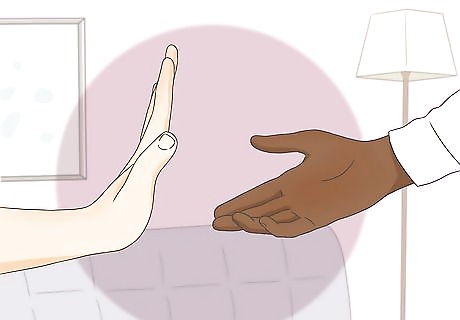
views
- Walk away from anyone who ignores your concerns, looks down on your ambitions, or doesn’t give you the attention you deserve.
- Don’t compromise on major lifestyle differences, like wanting kids, financial habits, or political or religious beliefs.
- Stay away from anyone with a history of abuse. If you think you’re being abused, seek help from a friend or a counselor.
You have different expectations for having kids.

You want kids and they don’t, or vice versa. Don’t forget to bring this up early. You want kids and the clock is ticking, but your partner seems to shy away from the subject. Or, maybe kids are the last thing you see for yourself, but it’d mean the world to your significant other. Kids are a huge commitment, one that’s worth finding the right partner for. If you can’t see eye-to-eye on this, it may be time to consider parting ways. Your partner may have valid concerns for how they feel. Don’t dismiss the issue altogether. Rather, ask them why they feel that way, and express your own desires clearly.
You don’t agree on financial issues.

They’re financially irresponsible, or even controlling. One thing too many couples neglect is the money talk. Before diving into a relationship, ask them how they’d handle your joint finances. How you save and spend your money is up to you, but if your potential (or current) partner is fiscally careless or, sometimes worse, demands greater control of your own income, there may be bumpy roads ahead. Don’t be afraid to keep your income in your own private accounts until you get a read on how they spend their money, or until you can solve your current relationship finances.
Your politics or religions are too different.

You don’t want to compromise your own ideals for a relationship. Inter-religious relationships can totally work, but when the very fabric of your morals starts to clash, things might be at a breaking point. There are some things that you just won’t—or shouldn’t—budge on, and the two of you may never see eye to eye. Your personal beliefs affect every part of your life, and your partner’s life, including your relationship. Take these differences seriously, and have a heart-to-heart to explore how they might affect you.
There’s no plan for the future.

They don’t have ambitions for themselves or the relationship. Some people found their groove and they’re perfectly happy dancing to it. But others have no groove and aren’t very interested in finding one, either. An unambitious partner can drag your own ambitions down. On top of that, a partner who doesn’t seem to care if your relationship is going anywhere is just a romantic anchor keeping you from sailing bluer seas. Suggest some hobbies to do together, like getting into a new art or a club sport. If they don’t show any enthusiasm for the idea, it’s time for you to sail into the sunset.
You can’t do long distance.

Long distance works for some, but not for you. And that’s understandable! Long-distance relationships place some unique strains on a romance. You won’t touch them for long periods, and it might be harder just to keep in touch. Don’t feel guilty for wanting something more immediate. If you’re unsure about trying long-distance, but want to, make your anxieties clear to your partner. It’s easier to work through it if you both know where you stand.
They don’t support your ambitions.

You need a cheerleader to support you, and they’re not it. You just finished your manuscript, or tried out for that team, or you want to go back to school. Except your partner doesn’t seem to care. Or worse, they don’t think you need those things. Your life is your own, and if they won’t cheer you on as you go out and grab it, then they don’t have a place in it. Make sure to show interest in and support your own partner in their endeavors. Everyone needs an ally.
There’s no communication.

You seem to be on different pages. All the time. Your words go in one ear and out the other. Or maybe it seems like everything they do is a total surprise, with no warning, and you’re left in the dark. Even small discussions seem to break down into hurt feelings or silence. It’s a bit trite, but it’s true: communication is key. Otherwise, what’s the point of romance? Practice your own communication skills by saying what you mean, using “I” or “we” statements when talking about your relationship, and hearing your partner out, even if it’s difficult.
Your lifestyles aren’t compatible.

The way you live your lives keeps you from connecting. Having diverse interests can keep a relationship burning strong. But when those interests become priorities over your relationship, it can be a problem. Ideally, look for someone who makes time for both you and their interests. Ask your partner if they want to join you in your activities. Schedule them when you’re both available, and show interest in their own hobbies.
You have incompatible sex drives.

Your mismatched libidos cause trouble in the bedroom. You both have physical needs and expectations. If they’re not meeting yours, or their needs are more than you can handle, it could start to seep into things other than the bedroom. When the time is right (like in the afterglow), bring up the subject of when and how often your partner envisions having sex. You might be able to compromise. Or, you might not, in which case you’ll both work better as something casual.
You’re just not attracted to them.

You can’t bring yourself to appreciate every part of them. You’re attracted intellectually, but not physically. Or, you’re into their looks, but not their mind. There are some strong relationships with these dynamics, sure, but if it weighs on your mind constantly, it might be a bigger stumbling block than you can manage. Ideally, you love all of them. If your lack of attraction is to the detriment of the relationship, you’re doing your partner a disservice by keeping them from someone who enjoys all their parts.
They won’t stop flaking on important plans.

You can’t rely on your partner to be there when they say they will. From date nights to big life events like graduations, whatever it is, they tend to be MIA. It’s disappointing at the best of times. At the worst of times, it’s a signal that they’re just not ready to commit. Busy schedules are one thing, but a failure to show up when it matters is another. Make it clear to your partner that you want them by your side, and you want to be by their side. If they still go AWOL, go AWOL on the relationship.
They don’t seem interested anymore.

The passion was there, but the flame has fizzled. There are steps you can take to rekindle your romance, sure, but sometimes people just drift apart naturally. It’s not anyone’s fault, really, but you had each other when you needed each other. Now you just don’t need each other, and you’re both ready for other things. Visit a relationship counselor to work out a waning of interest. They may be able to help you and your partner rediscover each other.
You just can’t trust them.

A relationship without trust isn’t much of a relationship. It’s not just cheating. They say one thing and do another. They don’t keep their word. It might even just be that they talk bad about you behind your back. Your partner is your confidant, or at least should be. If you can’t see yourself confiding in them like that, it’s time to look elsewhere.
They don’t give you attention.

You need someone who makes time for you. Sure, there’s such a thing as unhealthy attachments, but sometimes the dial spins the other way. If you’re not obsessed with each other, you may as well be friends with benefits, not committed partners.
They ignore your concerns.

They tend to avoid difficult topics or serious conversations. Your partner should be one of the first people you turn to to talk about tough issues—politics, culture, even problems in your own relationship. If you can’t sit them down every once in a while for a serious chat, then your communication isn’t there from the get go. You can’t find compromises when your partner won’t address the issue to begin with. Ask your partner why they don’t want to talk about these things. There may be valid underlying issues like trauma or anxiety to speak with a therapist about.
They like to argue a bit too much.

You feel like everything is some sort of challenge. It might start as a healthy bit of banter, but you’ve noticed that fun jabs have turned into full-blown arguments. For some people, everything is a competition to be won, including conversations with their partners. That doesn’t make for a very peaceful relationship. Draw clear boundaries about what kind of teasing you like, and make it clear that you don’t enjoy verbal sparring.
They’re still obsessed with their ex.

They haven’t healed from past relationships or breakups. Look, we’ve all got some sort of history. That’s just how the dating game works. But some people get back into the game before they’re ready, which doesn’t give their new relationship a fair shot at thriving. Worse, it can make you feel like you’re second to someone who isn’t even in the picture anymore. If this applies to your partner, take a break to let them sort things out. It doesn’t have to spell the end of the relationship, but it shouldn’t affect your happiness, either.
You don’t like their friends.

You prefer not to hang around their crowd (or they don’t like yours). Whichever way it goes, don’t underestimate how your social circles will affect your relationship. Your friends are as special as any potential partner, and if you find yourself choosing between one or the other, go with the people who’ve known you and stuck by you longer.
They’re a bit too clingy.

You need your space, but they don’t want to give it. It’s true that a romantic couple is a unit, but that doesn’t mean you’re not still an individual. A partner who always needs to be near you, or who pouts when you ask for space, can be suffocating. Be up front about your expectations and independence. If they don’t respect those expectations, go ahead be single and independent a bit longer.
There’s a cleanliness issue.

Your partner’s poor hygiene repels you. They’re perfect in every way. Except that their home is a mess. Or they have a certain… musk. Or they refuse to wash their hands after using the restroom. Your hygiene and that of your surroundings are linked to your mental health. Are you ready to compromise that? If this is your current situation, encourage them with “I” statements like, “I love it when you smell so clean,” or, “I like visiting when your room is tidy.”
They won’t try new things.

If they’re fine missing out on fun experiences, you’ll miss out, too. One of the many perks of a relationship is a having a buddy you can count on to be up for (almost) anything. A partner in crime. A Thelma to your Louise. But if they’re fine sitting at home day in, day out, you better be fine doing the same.
You don’t feel comfortable being yourself.

You feel on-guard or disingenuous around your partner. You’re trying to be someone you're not to make them stay with you. Or, you don’t feel like you can be vulnerable with them. The beautiful, scary truth is that your true colors are going to show sometime, and putting on an act will only exhaust you. It’s normal to present a slightly different version of yourself in the early stages. But let that other version fade away. If they truly love you, they’ll love the real you, too.
They don’t want help with substance abuse.

Their drug or alcohol use gets in the way of your relationship. Addiction is a disease, and people suffering from addiction deserve your respect and sympathy. But dating someone who doesn’t want to get better is taxing, and doesn’t make for a healthy relationship. If they show no desire to help themselves, hold off on romance until they do. Make an effort to help an addicted partner with things like counseling or supporting them through rehab. But if you’ve done all you can do, don’t be too hard on yourself for protecting your own peace.
They have a history of cheating.

Their past cheating creates rifts that are difficult to heal. People are a bit more complicated than the old adage, “Once a cheater, always a cheater,” but we won’t deny that it’s a tough hurdle to overcome in a relationship. If they have a history of cheating on their past partners, tread lightly, and don’t be too surprised if it happens to you. If they cheat on you, we won’t blame you for walking out the door. To heal a relationship after cheating, take some time apart, and be transparent and frank with your emotions. Don’t feel like you need to stay just because they feel guilty.
They have a history of physical or verbal abuse.

Their abusive behavior is dangerous to yourself and others. Of all the entries on this list, this is the one with no room for compromise. Someone who uses physical or emotional violence or manipulation to get their way should be avoided at all costs. Learn to recognize the signs of an abusive relationship, and get out at the first opportunity. If you’re currently experiencing abuse, reach out to a trusted friend, family member, or counselor for help dealing with emotional or physical abuse.



















Comments
0 comment